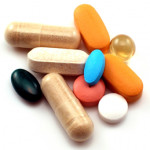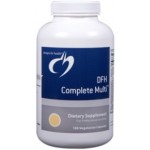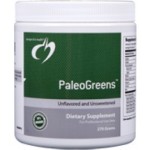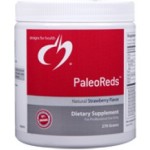 2. Many vitamins contain artificial colors derived from coal tar, with documented negative health consequences, and other disturbing ingredients. A high-quality supplement will never contain any added dyes and only the beneficial compounds you want. In addition to containing synthetic, isolated forms of vitamins, pre-formed vitamin A, and folic acid, the dangers of which I covered in my last post, many vitamins are also loaded with additives. One-A-Day Women’s Formula, for example, contains FD&C Blue #2 Lake (associated with tumor growth in rats, especially those of the brain and spine), FD&C Yellow #5 Lake (tartrazine, a known reproductive toxin), and FD&C Yellow #6 Lake (linked to hyperactive behavior, banned in several countries, found to cause adrenal tumors in animals). Dyes can be derived from coal tar and contain aluminum, petroleum, ammonia, or antifreeze. Children’s Flintstones Vitamins contain Blue #2 and Yellow #6, as well as FD&C Red #40 (linked to aggravation of ADHD symptoms, DNA damage, and cancer in mice), refined sugar, and genetically-modified ingredients. Note that the company that manufactures Flintstones and One-A-Day vitamins, Bayer, put $381,600 into opposing California’s Prop 37, which if passed would have required them to adopt honest labeling practices and identify products containing genetically modified ingredients (GMOs). These vitamins are similar to eating processed foods.
2. Many vitamins contain artificial colors derived from coal tar, with documented negative health consequences, and other disturbing ingredients. A high-quality supplement will never contain any added dyes and only the beneficial compounds you want. In addition to containing synthetic, isolated forms of vitamins, pre-formed vitamin A, and folic acid, the dangers of which I covered in my last post, many vitamins are also loaded with additives. One-A-Day Women’s Formula, for example, contains FD&C Blue #2 Lake (associated with tumor growth in rats, especially those of the brain and spine), FD&C Yellow #5 Lake (tartrazine, a known reproductive toxin), and FD&C Yellow #6 Lake (linked to hyperactive behavior, banned in several countries, found to cause adrenal tumors in animals). Dyes can be derived from coal tar and contain aluminum, petroleum, ammonia, or antifreeze. Children’s Flintstones Vitamins contain Blue #2 and Yellow #6, as well as FD&C Red #40 (linked to aggravation of ADHD symptoms, DNA damage, and cancer in mice), refined sugar, and genetically-modified ingredients. Note that the company that manufactures Flintstones and One-A-Day vitamins, Bayer, put $381,600 into opposing California’s Prop 37, which if passed would have required them to adopt honest labeling practices and identify products containing genetically modified ingredients (GMOs). These vitamins are similar to eating processed foods.
3. Many vitamins need co-factors to be absorbed, and many multivitamins do not include enough minerals, or the enzymes that would be included with vitamins from whole foods and aid with their absorption. When we get our vitamins from real, fresh food, they’re complete and all the enzymes, minerals, and antioxidants work synergistically. There are 12,500 phytonutrients from fruits and vegetables compared to the amount that supplement companies choose to manufacture and put on the shelves. When supplementing with a particular vitamin, one needs to be aware of what co-factors are necessary so the nutrients are actually utilized. The body doesn’t know what to do with isolated nutrients. For example, if calcium is not taken with vitamins D3 and K2, it doesn’t go to the bones where it is needed, and can migrate to the circulatory system. If calcium is taken, but the body is lacking magnesium , then calcium is also not correctly utilized by the body. When we take this into account, it makes sense that even though most of us have no shortage of calcium in our diet and it is one of the most commonly purchased supplements, osteoporosis is more prevalent than ever.
4. Studies and results often cited on supplement packaging are often not using the same quality or dose as found inside the bottle. Many vitamins are included in doses smaller than have been found to produce a therapeutic effect. For example, multivitamin should include vitamin D, but a typical adult dose should be about 4000 IU/day in a person who is not deficient, and a typical multivitamin often only has 400 to 1000 IU. This is why it is important to consult a healthcare professional with a background in nutrition when using supplementation.
5. Supplement companies worth buying from are proud of their standards of quality control, analysis and testing. When a supplement manufacturer purchases raw materials, they receive a certificate of analysis (COA) from the supplying company. This is the standard of the law, but there is a potential for conflict of interest because the manufacturing company is not held liable for mistakes or lies on the COA. The best supplement manufacturers will hire a third party company to test and certify the raw materials a second time. This is part of the reason why high-quality whole food supplements are usually more expensive. You can contact supplement companies and ask them about their testing process, whether the material is natural or synthetic, and where they get their raw materials.
Oxidative stress is implicated in greater than 150 major conditions. The body’s natural mechanisms to clear oxidative stress cannot function without phytonutrients from fruit and vegetables. The American Heart Association and the American Cancer Society recommend food over supplements for prevention of disease. The ACS website reads, “The American Cancer Society recommends eating a variety of healthful foods– with most of them coming from plant sources rather than relying on vitamin supplements.” MyPlate.gov recommends 7-13 servings of fruit and vegetables a day, and for those with pre-existing conditions such as heart disease and diabetes, 16-18 servings per day are recommended. Because most people have a hard time maintaining this, supplements become necessary to fill the nutritional gap.
Related Supplements I Recommend:
 DFH Complete Multivitamin is a full-spectrum multivitamin with Albion chelated minerals for maximum absorption and bioavailability. This powerhouse multivitamin supplies supporting nutrients not normally found in regular multis, such as alpha lipoic acid, TMG, fruit bioflavanoids, choline, and inositol. This formula also contains high gamma tocopherol vitamin E, high levels of all B vitamins, including our proprietary NatureFolate™ blend of active isomer naturally-occurring folates, and natural mixed carotenoids. This copper and iron free version is appropriate for men and postmenopausal women.
DFH Complete Multivitamin is a full-spectrum multivitamin with Albion chelated minerals for maximum absorption and bioavailability. This powerhouse multivitamin supplies supporting nutrients not normally found in regular multis, such as alpha lipoic acid, TMG, fruit bioflavanoids, choline, and inositol. This formula also contains high gamma tocopherol vitamin E, high levels of all B vitamins, including our proprietary NatureFolate™ blend of active isomer naturally-occurring folates, and natural mixed carotenoids. This copper and iron free version is appropriate for men and postmenopausal women.
 PaleoGreens™ is the great tasting Designs for Health greens food made with over 90% organic ingredients. The vegetable, fruit, and berry ingredients are brightly colored and non-oxidized, as the powders are protected from heat, UV light and moisture from start to finish. These greens have a Paleo profile; they contain no grains, legumes, alfalfa, corn, gluten, fructose or artificial sweeteners. Unlike other greens products, we never add inexpensive fillers or bulking agents such as fiber, whole grasses, pectin, rice bran, and/or flax, which account for 40% to 60% of the content of most other greens products. We work closely with our certified organic growers to ensure the optimal preservation of enzymes and beneficial phytonutrients in PaleoGreens™ ingredients. These ingredients are harvested at their peak of potency and immediately concentrated and dried by utilizing proprietary cool-temperature processes that preserve their energetic and nutritional integrity.
PaleoGreens™ is the great tasting Designs for Health greens food made with over 90% organic ingredients. The vegetable, fruit, and berry ingredients are brightly colored and non-oxidized, as the powders are protected from heat, UV light and moisture from start to finish. These greens have a Paleo profile; they contain no grains, legumes, alfalfa, corn, gluten, fructose or artificial sweeteners. Unlike other greens products, we never add inexpensive fillers or bulking agents such as fiber, whole grasses, pectin, rice bran, and/or flax, which account for 40% to 60% of the content of most other greens products. We work closely with our certified organic growers to ensure the optimal preservation of enzymes and beneficial phytonutrients in PaleoGreens™ ingredients. These ingredients are harvested at their peak of potency and immediately concentrated and dried by utilizing proprietary cool-temperature processes that preserve their energetic and nutritional integrity.
 Physicians and nutritionists are recommending a diet rich in brightly-colored fruits and vegetables because they contain phytonutrients that act as antioxidants to ward off free radical damage. From polyphenols in apples to natural vitamin C from the Amazonian acerola cherry,PaleoReds™ combines over a dozen fruits and vegetables and their phytonutrients from the red/purple group to help reduce the risk of common chronic diseases and premature aging. For our PaleoReds™ powder, Designs for Health has chosen the highest quality, antioxidant-rich ingredients, with over 80% being certified organic and all of which meet the stringent standards. The grape skin extract is standardized to resveratrol and the pomegranate is standardized to ellagic acid. This great tasting fruit and berry formula is ideal for patients who need antioxidants, yet are sensitive to synthetic vitamin C made from corn.
Physicians and nutritionists are recommending a diet rich in brightly-colored fruits and vegetables because they contain phytonutrients that act as antioxidants to ward off free radical damage. From polyphenols in apples to natural vitamin C from the Amazonian acerola cherry,PaleoReds™ combines over a dozen fruits and vegetables and their phytonutrients from the red/purple group to help reduce the risk of common chronic diseases and premature aging. For our PaleoReds™ powder, Designs for Health has chosen the highest quality, antioxidant-rich ingredients, with over 80% being certified organic and all of which meet the stringent standards. The grape skin extract is standardized to resveratrol and the pomegranate is standardized to ellagic acid. This great tasting fruit and berry formula is ideal for patients who need antioxidants, yet are sensitive to synthetic vitamin C made from corn.
Resources:
Vitamin E and the Risk of Prostate Cancer: The Selenium and Vitamin E Cancer Prevention Trial.
Folate and cancer: How DNA damage, repair and methylation impact on colon carcinogenesis.
Dietary supplements and mortality rate in older women: the Iowa Women’s Health Study.
Multivitamin use and breast cancer incidence in a prospective cohort of Swedish women.
Should I Worry About Taking Supplements? – Alliance For Natural Health
Why You Should Not Stop Taking Your Vitamins – Mark Hyman, M.D.
Nutrition Tips: Folic Acid: Killer or Cure-All? – Mark Hyman, M.D.
Don’t Take Your Vitamins! – Jonny Bowden
When Not to Take Your Multivitamin – Joseph, Mercola, M.D.

